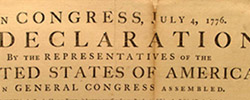 A recent discovery by an inquisitive graduate student is a major contribution to both the history of Haiti and the study of the international significance of the Declaration of Independence of the United States.
A recent discovery by an inquisitive graduate student is a major contribution to both the history of Haiti and the study of the international significance of the Declaration of Independence of the United States.
A story in the March 31, 2010 edition of the New York Times reports that Julia Gaffield, a Duke University graduate history student, discovered the only surviving copy of Haiti’s 1804 Declaration of Independence. Gaffield made the discovery in February while examining early nineteenth-century correspondence collected in Great Britain’s National Archives in London. The eight-page pamphlet is the only known surviving copy of the Haitian Declaration distributed by the newly independent government to other countries as an official announcement of the island’s separation from France. The original final draft vanished for unknown reasons not long after the founding of the Republic of Haiti on January 1, 1804.
Not surprisingly, there is keen interest in Haiti to bring the copy home. “It is a very important document for our country,” said Wilfrid Bertrand, director-general of Haiti’s National Archives, in an interview with the Associated Press. “It has every bit the same importance as the American Declaration of Independence.”
For obvious reasons, the find also is considered a ray of hope and a much-needed source of pride for Haiti, a long-suffering nation before the magnitude 7.0 earthquake that killed about 230,000 Haitians on January 12. Poverty, political turmoil, and governmental corruption have plagued the nation for decades, leading most to forget (if they ever knew) that Haiti has the distinction of being the first independent black republic in the world.
Furthermore, Haiti’s declaration is one of many declarations inspired by the U.S. Declaration of Independence. David Armitage, author of The Declaration of Independence: A Global History, writes that the first draft of the declaration was written by an admirer of Jefferson familiar with the American state paper. However, the principal reviser of the Haitian declaration thought Jeffersonian language too bloodless and insipid to capture the sentiments of former slaves declaring their freedom.
“All that which has been formulated is not in accordance with our true feelings; to draw up the Act of Independence, we need the skin of a white man for parchment, his skull for a writing desk, his blood for ink, and a bayonet for pen,” said Louis Félix Mathurin Boisrond Tonnerre, who served as a secretary to Jean-Jacques Dessalines, leader of the Haitian Revolution. Not surprisingly, the American reaction to the Haitian Revolution was to equate it with slave revolt, leading Thomas Jefferson to refuse official recognition of the republic out of fear that such a move would inspire slave uprisings in the United States. (However, Jefferson had ordered the shipment of arms and supplies to the Haitian rebels because he feared a French foothold too close to the U.S. mainland.) In 1862, Abraham Lincoln finally offered formal recognition to Haiti, a year after the shots were first fired in a war he would later proclaim was fought to secure “a new birth of freedom” in the hemisphere’s leading slave-holding republic.



Eric J. Hobsbawm, RIP
Eric J. Hobsbawm, 1917-2012
The New York Times notes the death of Eric Hobsbawm, Britain’s preeminent social and labor historian whose work on capitalism and the lower-class unrest in Europe of “pre-political” road agents, millenarians, levellers, and urban rioters in 18th and 19th century society helped shed new light on the Age of Revolution. He moved historical understanding of the period from solely examining the record through the lens of great men to a close examination of working men and women. An unrepentant Marxist, he only in recent years chose silence regarding his ideology after decades of supporting the Communist Party instead refuting his beliefs, a decision that made him enormously controversial even in left-wing intellectual circles. His politics always baffled me: How can someone remain in the CP when you die at 95, old enough to have witnessed firsthand the depredations of Stalin and the ruthlessness of the Soviets crushing Hungary, Czechoslovakia, and Afghanistan? His own comments on his choice to remain loyal to the party smack of the Red utopianism that has often seduced European and American intellectuals:
The wealth and peace after World War II (the longest period without warfare in the history of Europe since the pax romana) was never what it seemed to be — at least that’s what Hobsbawm indicated through most of his work. Furthermore, he was a dedicated anti-fascist who lived through the rise of Hitler and National Socialism, so I wonder what he did want society to achieve if the defeat of the Nazis wasn’t enough to verify the benefits of democratic capitalism. No matter: Hobsbawm argued that Stalin was the real hero that created the West’s economic expansion, as an obituary in The Telegraph outlines along with other interesting quotes regarding his politics. Nihil nisi bonum. Great minds are often inconsistent minds, but his contribution to reshaping study of Revolutionary America included influencing historians who began to study how riotous behavior in Boston and New York motivated independence as much as ideology. Alas, when you get Marxists or their New Left fellow travelers in the room, someone always starts to talk about class in America — and that’s when I leave the room to find the Consensus Historians all agreeing to go out to the nearest pub. RIP.
Leave a comment
October 7, 2012 · 4:48 am